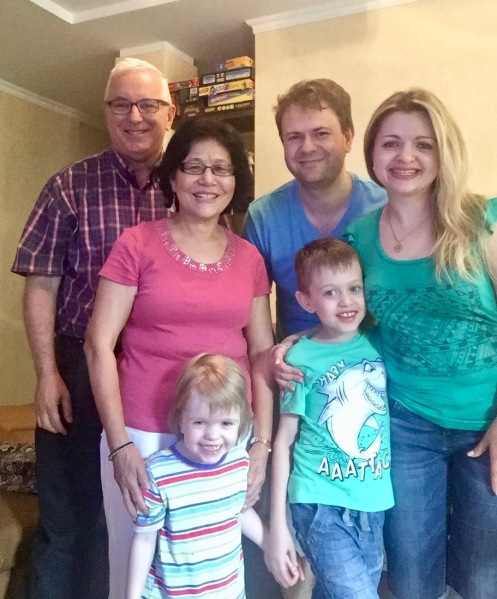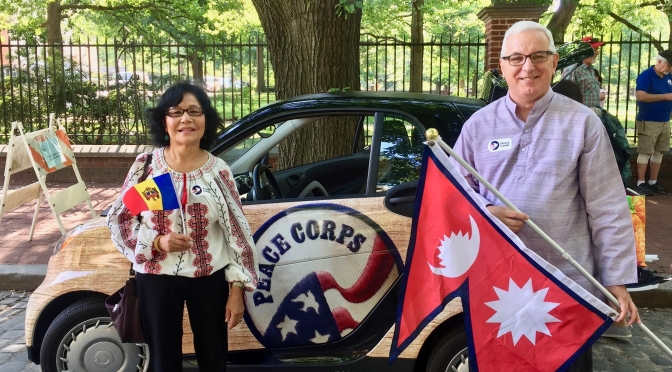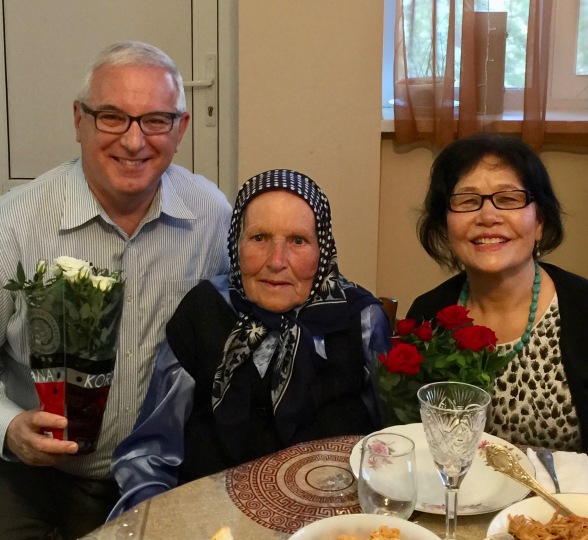So little time left, so many goodbyes.
The past two weeks have been a blur of ceremonies, dinners and get-togethers as we say farewell to our Moldovan and American friends before we depart on Wednesday.

On Tuesday morning, Ialoveni’s mayor, Sergiu Armașu, joined my colleagues at the library to present Champa and me with certificates and gifts and to thank us on behalf of the city we’ve called home as Peace Corps Volunteers. He and library director Valentina Plamadeala were generous in their remarks, and I was especially moved when two boys from our robotics team (shown above) rose to speak as well. Even though it was shortly after 10 a.m. we toasted the moment with champagne and cake (yet another reason we’ll miss Moldova).

I’ve already posted on Facebook the amazing portrait our host family gave us at a farewell dinner we held a few days earlier. In addition, our bunica, or grandmother, gave us a gorgeous handmade Moldovan carpet. During the past several days we’ve received other beautiful gifts as well, all of which we are bringing home to remind us of our time here.


We met with the members of my English conversation class and their families for a farewell party at Casa della Pizza, Ialoveni’s popular pizza restaurant. Champa also met there with her language tutor and then with some of the English teachers from her school. It’s also where we had lunch yesterday with a Peace Corps friend and are meeting tomorrow with several others. After all, Casa della Pizza does serve the best pizza in Moldova.

We sipped beers and ate mamaliga and friptura on the outdoor verandah of another local restaurant when we said goodbye to “Mr. Tim,” a former Peace Corps Volunteer who stayed in Ialoveni to teach English (shown above). He introduced us to it shortly after we arrived and we became friends. With members of Champa’s Peace Corps group, our farewell party was at The Uptown Cafe, a restaurant in the capital.


We’ve also been saying goodbye over home-cooked meals, such as one we shared with the family of dna Liuba, the Peace Corps Moldova staff member whom I’ve assisted with communications projects, and the Nepali meal we served the family of dna Ana, the teacher who worked closely with Champa on their memorable project to create costumes for the school’s drama program.

We’re still not done and, amid all of these celebrations, I’ve also been exchanging goodbye messages with my former Diamond Challenge students, promoting North Carolina’s partnership with Moldova and delivering two presentations to the newest members of Peace Corps Moldova’s “community and organizational development” group, who began their training a few weeks ago. Champa and I have been packing, too.
Each goodbye has been emotional and, collectively, they’ve been draining, not to mention fattening, but they have helped us absorb the reality that we’re leaving this place in which we’ve invested so much of ourselves over the past two years. We’ve taken to heart the advice we heard at our COS conference several weeks ago, to embrace this process of saying goodbye rather than letting our final moments drift away. We’re glad we listened.
Nonetheless, as soon as we get home, we’re going to the gym.






 I was invited because I recently assisted the partnership as it prepared to ship hundreds of English-language books to Moldova with two NGOs. I worked with Bob Gingrich, Peace Corps Moldova’s director of management and operations and a fellow North Carolinian (left in photo), who will soon distribute the books among PCVs to share with their host communities.
I was invited because I recently assisted the partnership as it prepared to ship hundreds of English-language books to Moldova with two NGOs. I worked with Bob Gingrich, Peace Corps Moldova’s director of management and operations and a fellow North Carolinian (left in photo), who will soon distribute the books among PCVs to share with their host communities. I ate lunch with Kate before her talk so she could tell me more about the partnership and I could answer some of her questions about Moldova, which she is visiting for the first time, thanks to a grant from
I ate lunch with Kate before her talk so she could tell me more about the partnership and I could answer some of her questions about Moldova, which she is visiting for the first time, thanks to a grant from  Also arriving here this past weekend was Willow Stone, a student from Clayton High School who will live with a Moldovan host family and study Russian.
Also arriving here this past weekend was Willow Stone, a student from Clayton High School who will live with a Moldovan host family and study Russian.


 The Moldovans who attended on Monday picked up not only new teaching ideas but also armloads of free books to bring back to their schools. Some of them have also interacted over the years with Peace Corps Moldova’s English Education program, in which Champa has served.
The Moldovans who attended on Monday picked up not only new teaching ideas but also armloads of free books to bring back to their schools. Some of them have also interacted over the years with Peace Corps Moldova’s English Education program, in which Champa has served.

 I’d consider myself lucky to have Dr. Iuliana as my primary physician back home.
I’d consider myself lucky to have Dr. Iuliana as my primary physician back home. I returned our smoke alarms and fire extinguishers. I returned one of our medical kits. I picked up the last of our medical prescriptions. Check. Check. Check.
I returned our smoke alarms and fire extinguishers. I returned one of our medical kits. I picked up the last of our medical prescriptions. Check. Check. Check.




 It was a complicated journey for a special gift. Thanks again, Andy and Bob!
It was a complicated journey for a special gift. Thanks again, Andy and Bob! However, while we were all hanging out this past Sunday, our host sister, Alisa, told us again how much they enjoy the photo album we brought with us to Moldova two years ago, showing our family and life in America. She asked whether I could send her images of its pages before we left.
However, while we were all hanging out this past Sunday, our host sister, Alisa, told us again how much they enjoy the photo album we brought with us to Moldova two years ago, showing our family and life in America. She asked whether I could send her images of its pages before we left.














 As before, “Keep” must fit into two suitcases each. It’s a lot easier this time since we’re leaving behind many of the clothes we brought — worn-out socks, yes, but also shirts and other items we’re now placing into our second pile.
As before, “Keep” must fit into two suitcases each. It’s a lot easier this time since we’re leaving behind many of the clothes we brought — worn-out socks, yes, but also shirts and other items we’re now placing into our second pile. We’re also placing items in a special room of the Peace Corps lounge where departing volunteers leave things for those still serving. We found some great things there ourselves and now it’s our turn to pay it forward.
We’re also placing items in a special room of the Peace Corps lounge where departing volunteers leave things for those still serving. We found some great things there ourselves and now it’s our turn to pay it forward.




 When I served in Nepal years ago, I was sick frequently and was eventually “med-sep’d” before my scheduled departure date. Not this time.
When I served in Nepal years ago, I was sick frequently and was eventually “med-sep’d” before my scheduled departure date. Not this time. If you’re not fully committed, you’re probably not going to make it.
If you’re not fully committed, you’re probably not going to make it.





 Moldova State University, the country’s flagship academic institution, doesn’t even have a news office, much less a system for promoting faculty research.
Moldova State University, the country’s flagship academic institution, doesn’t even have a news office, much less a system for promoting faculty research.



